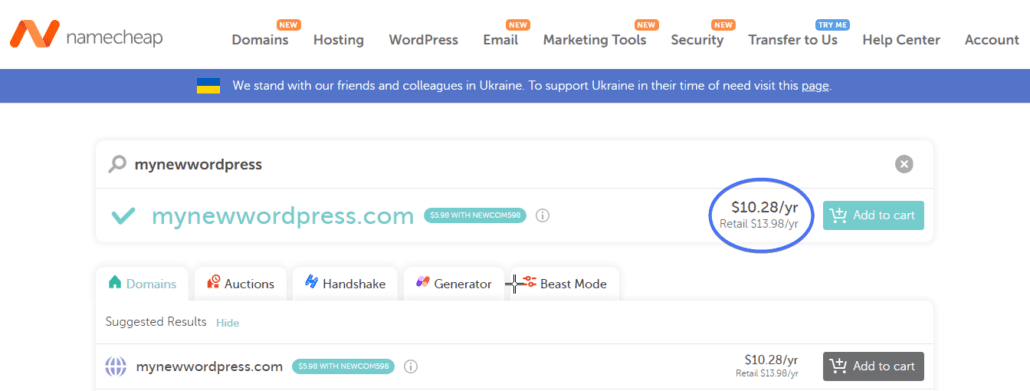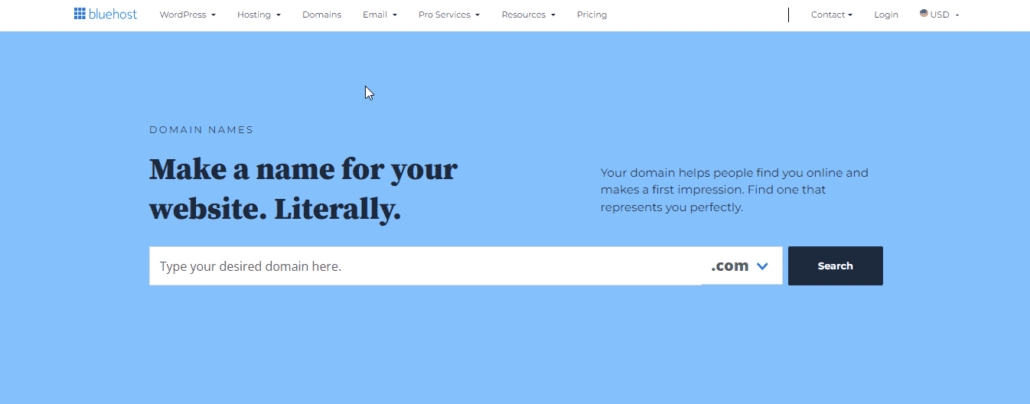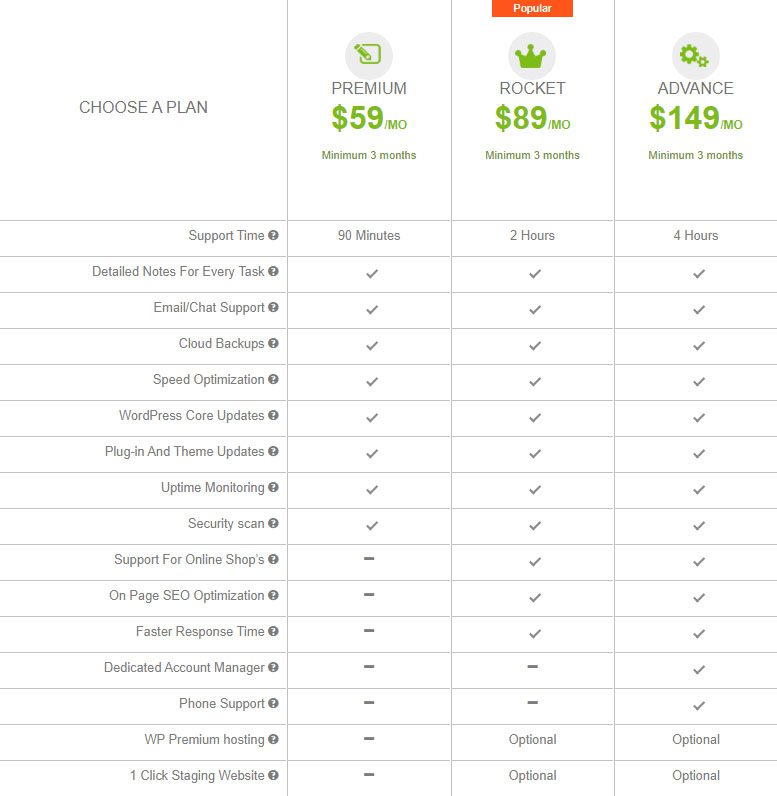.Org vs .Com – Which Domain Extension is Better for your WordPress Website?

Are you trying to decide between .org vs .com domains? Choosing a domain is an important part of building a successful WordPress website. This is because your choice of domain name will reflect the type of website you have and its purpose.
But, finding the ideal domain can be challenging. For instance, if you want to build a WordPress store, you will prefer a .com domain. But what if you can’t find one you like?
This article examines the differences between .org vs .com domain extensions. It also explains how to choose the right domain extension for your WordPress sites.
Table of Content
- What is a Domain Name Extension?
- .Org vs .Com Domains: What’s the Difference Between?
- .Org vs .Com: Pros and Cons
- .Org vs .Com: Which Should You Choose?
- Where to Buy .Org or .Com Domain Names
- Best Alternatives to .Org or .Com Extensions
- Conclusion
- Frequently Asked Questions About .Org vs .Com
What is a Domain Name Extension?
A website address is made up of two major components: the domain name and the domain name extension. The domain name is the unique online address that represents your business name and brand. It is the first part of a typical domain URL.
For example, our website address is fixrunner.com. The domain name is the first part, ‘FixRunner,’ which is also our brand name.
The domain extension is the second component of web addresses. They are known as top level domains (TLDs) and help people find and load sites more easily.
Without domain extensions, people will have to enter a website’s IP address to access it, which is long and confusing. So in the case of fixrunner.com, our domain extension is .com.
While some people don’t think much about the domain extension, it plays a big role in ensuring the visibility of your site. It can also help build credibility and reputation.

What Does .Com Extension Mean?
The .com extension is the most popular domain extension. It is a top level domain extension created to host commercial websites but has become a lot more.
The term ‘dot-com’ became the catchphrase for the rise of internet startups in the 1990s. This made the .com extension the de facto default internet extension.
So if you give someone a domain name today, they will likely assume that it has a .com extension.
This popularity has led to extensive usage of the domain extension. As a result, about 50% of sites on the internet use the .com extensions according to research.
It has also made it hard to find the right .com domain for your site.
What Does .Org Extension Mean?
The .org extension is another popular extension created for Nonprofits and organizations. The extension was created as an alternative for organizations that could not find the right domain extension.
At some point, .org domains were restricted to only NGOs. However, it is now widely used beyond the non-profit landscape. Using a .org domain gives a website a professional and credible look. It offers visibility to charity organizations, so potential donors can find them.
Today, schools, government, and businesses also use .org domains.
.Org vs .Com Domains: What’s the Difference Between?
There are several differences between .com vs .org domain extensions. Here are some differences between both extensions:
-
Uses – .Org vs .Com
.com extensions are best used for commercial and general purposes websites. .org domains are ideal for non-profits and open-source projects. It can also be used for community efforts and other non-commercial organizations.
-
Registration – .Org vs .Com
While both .com and .org domains can be registered on platforms like Godaddy and Bluehost, their primary registrars differ. The primary domain registrar for .org domains is the PIR (Public Interest Registry). For .com domains, the primary registrar is Verisign.
-
Acceptability and Perception
The .com extension is the most popular TLD. This acceptance is the reason why about 48% of websites use .com extensions.
.Org domains are less popular and used by fewer sites. Also, the fact that .org is derived from the word “organization” creates the perception that it’s meant to be used by organizations.
This means if you use a .org extension for your business site, people may doubt the purpose of the website. But, it can make your website more credible if used for a non-profit or corporate organization.
-
Trustworthiness – .Org vs .Com
.Com domains are the most trusted TLD. Respondents to a survey were asked how likely they were to click on various TLDs on a scale of 1 to 5. .com came in first with a trust score of 3.5. .Org was a close third with a score of 3.3.
This means that people trust and would click on .com domains. But, internet users also check other factors. Some browsers check for active SSL encryption before transacting on a site.
.Org extensions are also considered trustworthy. One reason for this is due to its long history with non-profits. Many people still consider it a nonprofit domain and see it as credible and authentic.

-
Memorability – .Org vs .Com
This has to do with how easy it is to remember a domain extension. Dot com domains are the most memorable domains.
This was also evident in the survey, where .com domains had a 44% memorability score. The survey found that people are 3.8 times more likely to assume that a domain has a .com extension.
.org had a memorability score of 32%, which means people are a little less likely to remember it compared to a .com domain.
-
Pricing
.org domains are cheaper than .com extensions. One reason for this is that the PIR registry operates like a non-profit.
-
Availability
As you may expect, the popularity of .com extensions makes it very difficult to find the ideal .com domain. However, .org domains are available since there’s not as much demand for them.
.Org vs .Com: Pros and Cons
.Com Pros and Cons
Pros
- Wide acceptance: .com domains are accepted all over the world. So your website won’t be restricted to a specific country or region.
- Authentic and credible: the .com extension is the face of the internet. It offers credibility and authenticity to websites. This is why about half of websites globally use .com domains. Most of the newer types of extensions are considered spammy and low quality.
- Easy to remember: memorability is a big factor to consider when choosing a domain. Dot com’s popularity makes it easy to remember.
- Mobile friendly: Most mobile devices are designed to easily access ‘.com’ sites. Most phones come with a .com button for quick ‘.com’ URL access.
- Trustworthy: .com domains are high-value and trusted, which can lead to more business.
- Transaction-ready: people associate .com domains with business. As such, someone looking to buy will likely visit a .com site rather than a .org website.
Cons
- Perceived bias: when a website has a .com extension, people assume it is intended to sell something. This is why every blog post or piece of information from a .com website sounds like they are trying to sell something. Other top level domains (TLDs) like .org seem more genuine for getting information.
- Costly: the high demand for .com extensions and the profitable nature of the Verisign registry make .com domains expensive. As such, you may need more than $5 to buy a .com domain.
- Availability issues: it is very difficult to find the ideal .com domain. Even when you find it, you may need to pay hundreds of dollars for it. Their popularity increased demand, making fewer domains available.
.org Pros and Cons
Pros
- Global Acceptability for Non-profits: .org domains offer credibility for organizations that use it. It is considered acceptable as it is seen as not profit-driven.
- Extensive domain options to choose from: only 5.2% of .org domains have been purchased so far, which leaves a lot of options to choose from. This means you can easily find the ideal domain for your project.
- Get more clicks: people consider .org domains to be more informative since they are mostly used by nonprofits. This can lead to increased clicks from search engines.
Cons
- Not Mobile Friendly: .org extensions are not mobile-friendly. Mobile devices lack a .org button as they have for .com. As such, people may find it difficult to access .com extensions on their mobile devices.
- Limited to Non-profits: .org domains are best used by nonprofits and organizations. The extension may not work well for a commercial venture. Most visitors may become confused about the purpose of the site if used for business.
.Org vs .Com: Which Should You Choose?
There are several factors to consider when choosing a domain. Here’s what you should consider when choosing a domain extension.
1. Availability
Availability is a major factor when choosing domains, especially .com domains. You may have an idea of the perfect domain name. But there’s a high chance that its .com domain is already taken.
Domain flippers register domain names to resell them for a higher price. As such, you may have to pay more for the domain if it is available from resellers.
2. Relevance
The domain extension you choose should be relevant to your niche or industry. You can use any domain extension if building a personal website. But if the website is for a business or organization, then it needs to be appropriate for the industry.
For example, if you are building an online clothing store, a .com domain will be a good fit, not a .org domain.
3. Price
Your budget is a major consideration when choosing a domain name. The ideal domain may be way above your budget, especially if you want a .com domain.
Prices of domains differ across various domain name registrars. .com domains cost about $10.28 per year on NameCheap and $12.99 on Bluehost.
It’s also important to consider the annual renewal cost for the domain. .org domains are slightly cheaper than .com.

4. Traffic
While domain extensions barely play a role in search rankings, some top domain name extensions may get more clicks than others.
For example, let’s say two websites (wordpress.com and wordpress.org) appear in a Google search result. People are more likely to click on wordpress.com because of the familiarity of the .com extension.
5. Target Audience
As mentioned previously, the extension you choose can have an impact on your click-through rate. For example, if your target audience is people looking to buy products, then a .com name will be ideal. But if your target audience is people looking for information, then consider a .org domain name.
Similarly, if your target audience is mobile users, you have to choose between .org vs .com. You should choose .com.
6. Your Brand Name
Typically, you want your domain name to reflect your brand name. However, it is very difficult to find the ideal domain with the demand for .com domains. Considering other factors, you can choose other available domain extensions like .org or even .co.
7. Type of Business or Organization
.com domains are best suited for profit businesses and other commercial endeavors. However, if you want a domain name for a non-profit organization, then a .org domain can work for you.
Where to Buy Domain Names – .Org vs .Com
Once you have an idea of the .com or .org domain you want, the next step is to check its availability and buy it.
There are many domain registrars out there. But as we mentioned previously, all .com domains are stored in the Verisign registry. .org domains are stored in the PIR registry.
Some of the best platforms for choosing WordPress .org vs .com domains and buying include:

- Bluehost
- Namecheap
- GoDaddy
- Domain.com
- Google Domains
- Hover
- DreamHost
- Name.com
- Network Solutions
- IONOS
- HostGator
- Dynadot
- NameSilo
- Gandi
- Register.com
- Hostinger
- Enom
- Shopify
- iPage
- OVHcloud
- SiteGround
- HostPapa
- Porkbun LLC
- BuyDomains
Best Alternatives to .Org or .Com Extensions
Here are some other alternative domain extensions to consider if .com and .org extensions aren’t right for you.
| Domain extension | Usage |
| .co | People assume that ‘co’ means company. This helps them understand that you are running a business. |
| .store | Suitable for ecommerce stores and retail businesses |
| .uk, .us, .ca, .au, .ru: etc. | These are country-code domain extensions. They are a great option if you are targeting only one country. |
| .net | .net means network. It is suitable for network-based organizations. You can use the extension for service providers and tech companies’ websites. |
| .ai | People associate .ai domains with innovation, although it is the country code for Anguilla. The extension is ideal for tech startups, companies, and institutions. |
| .edu | Suitable for educational institutions like schools, colleges, and universities |
| .io | .io is also associated with innovation, which makes it perfect for tech companies and startups. |
| .gov | Limited to government agencies, departments, and regulatory websites |
| .media | Suitable for blogs, newspapers, journalists, publishers, and other media-related brands |
Final Thoughts on .Org vs .Com
We have looked at the differences between .com and .org domain extensions. We reviewed their pros and cons and where to buy these domains. Overall, your choice between the two options should boil down to your unique needs and goals.
.org domains are best for nonprofits, while .com domain names are best for commercial WordPress sites. If you are looking to change your current domain, then you should check out this article on how to move your WordPress site to a new domain.
Remember, the Fixrunner team is available to help if you need assistance setting up your website. We will listen to your ideas and goals, offer professionals, and build a beautiful and SEO-friendly website for you. Contact us to learn more.
Frequently Asked Questions About .Org vs .Com
When Should You Use a .Com Extension?
.com extensions are best for websites created for commercial purposes. You should use a .com domain if you are building a business site, portfolio website, or other commercial sites. .com domains are also ideal when you want a memorable domain name. People are more likely to remember a .com than a .org domain.
When Should You Use a .Org Extension?
.org domains are best for websites with a non-profit intent. You should choose a .org extension if you are building a nonprofit, charity organization, or community project website. .org domains are also ideal when you aim to be a source of information or establish authority in an industry or niche.
The domains are seen as reliable sources of information due to their non-profit nature. This perception makes people more receptive to information from the sites.
Can you use .org for a business?
Yes, businesses can use .org domain extensions. .org domains used to be restricted to just Nonprofits. However, that restriction has been removed. However, people still see it as an NGO-related domain extension. That is why it is important to think it through before using a .org domain for business.
Are .org more trustworthy?
Yes, they are. .org domains are associated with non-profits which makes them trustworthy. These domains convey professionalism and authority compared to other TLDs. Some businesses choose .org domains to benefit from this trustworthiness.
Should I use .org if .com is taken?
It would be a good idea if you are an organization or a non-profit. However, if you are a business, then it may not be such a great idea. Why? Because .org domains are associated with Non-profits. As such, your business could be mistaken to be a non-profit.
Is .org good for SEO?
Domain extensions play a minimal role in search engine optimization (SEO). But when comparing .or vs .com, internet users looking to buy a product will likely click on .com domains. Those who are looking for information will trust and click on .org domains.





